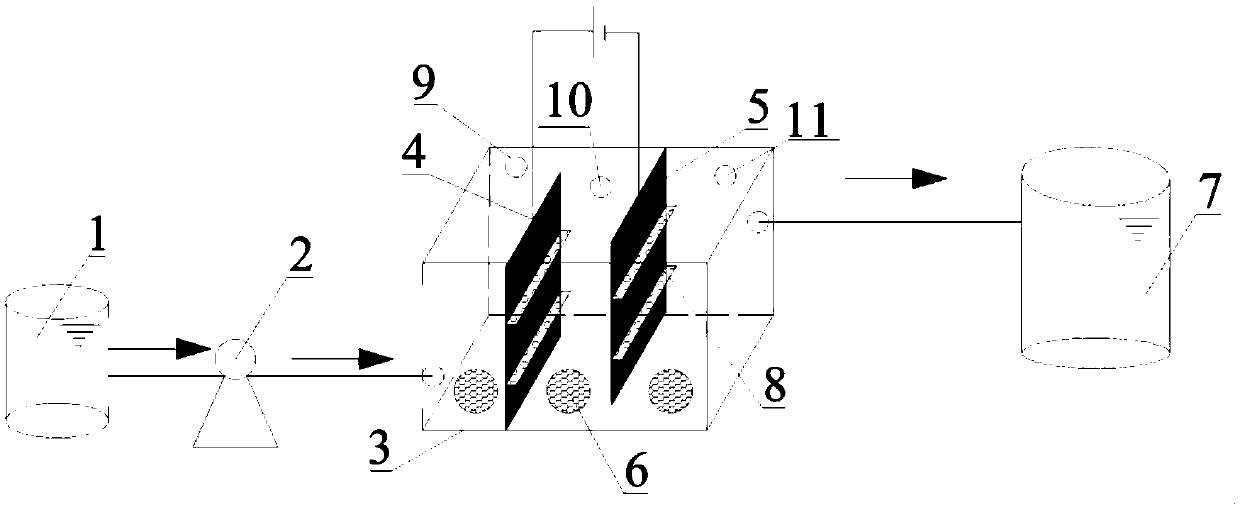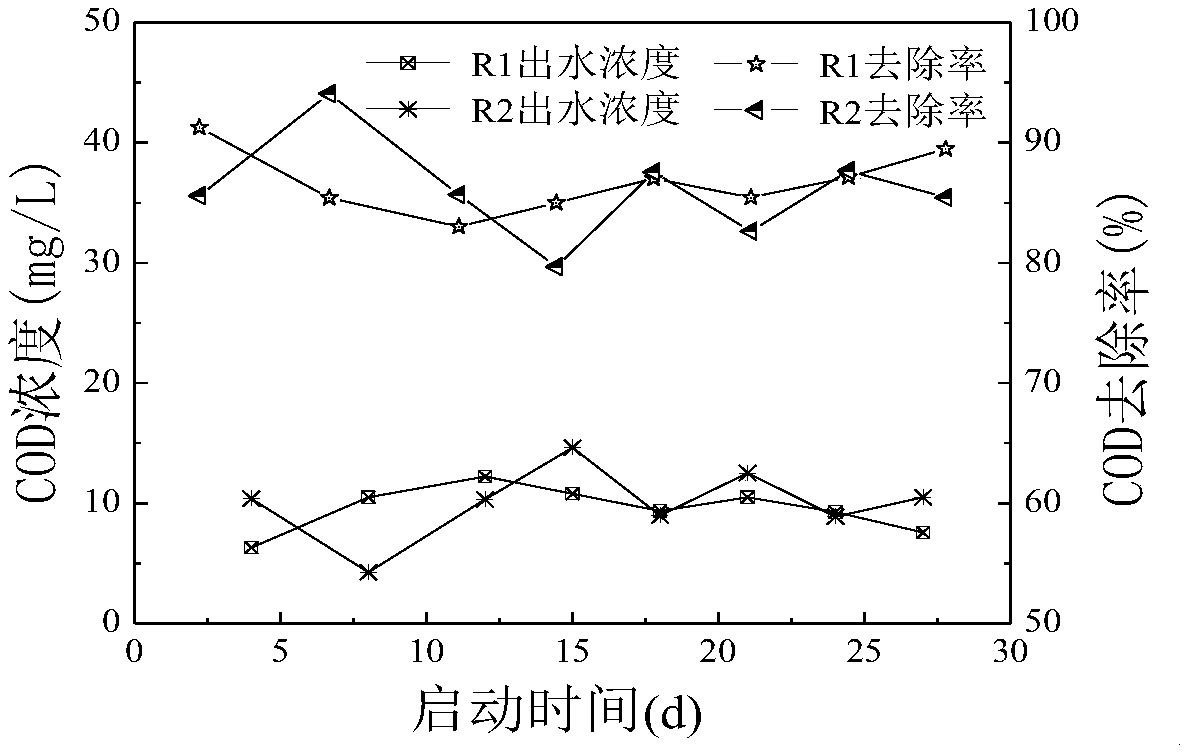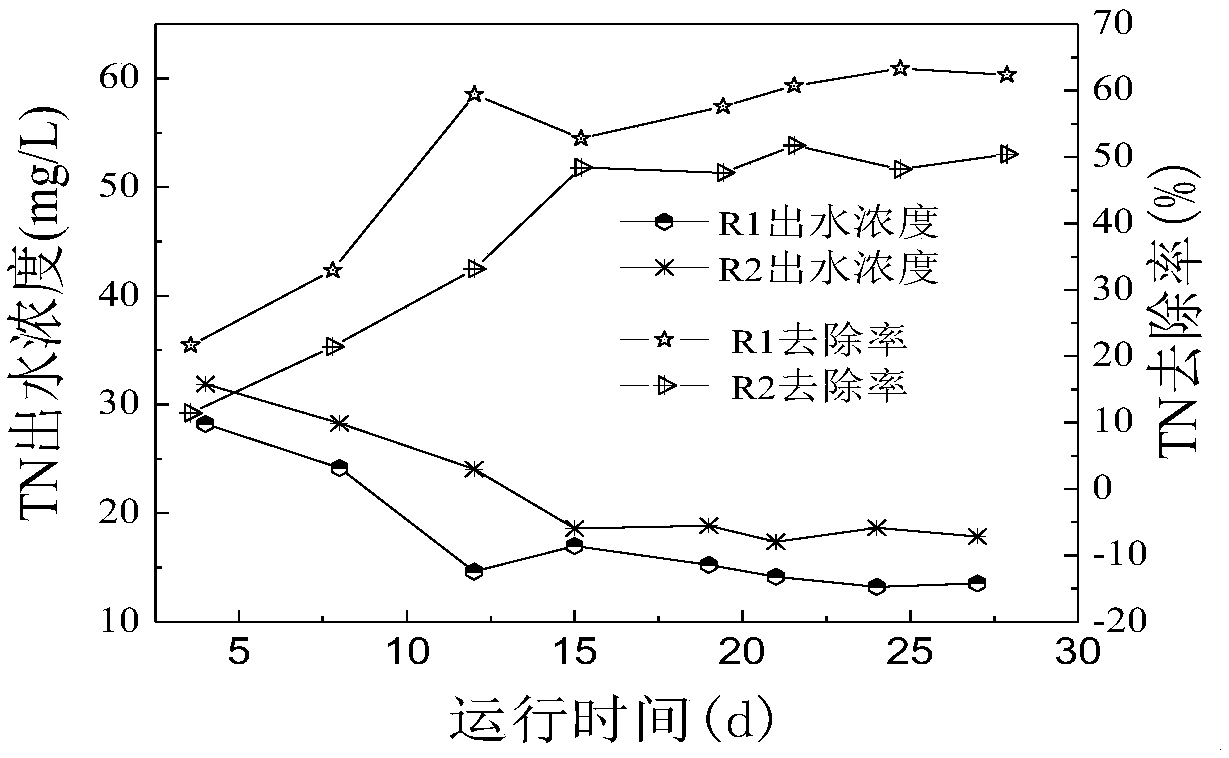Electro-coupling biological carbon removal and denitrification treatment method of low C/N ratio wastewater
An electrical coupling, nitrogen treatment technology, applied in electrochemical biological treatment, biological water/sewage treatment, water/sludge/sewage treatment, etc. Low C/N ratio, saving operating costs, and enhancing the effect of activity
- Summary
- Abstract
- Description
- Claims
- Application Information
AI Technical Summary
Problems solved by technology
Method used
Image
Examples
Embodiment 1
[0035] The treated waste water in the inlet pool 1 is typical slightly polluted water, and the specific water quality is as follows: C / N (carbon-to-nitrogen ratio)=2, chemical oxygen demand (COD average mass concentration) is 72mg / L, TN average mass concentration is 36mg / L; the temperature of the treated wastewater is controlled at room temperature 25°C; the aforementioned wastewater treatment system is used for treatment as the experimental group R1; at the same time, an anaerobic electrically coupled biological system is constructed (the aeration equipment is deleted from the aforementioned wastewater treatment system) , as the control group R2, the specific steps are as follows:
[0036] Step 1. In the initial stage of startup, set the OD of V volume 600 (The absorbance value of the solution at a wavelength of 600nm) The heterotrophic nitrification-aerobic denitrification enrichment bacteria solution with a value of 0.5 was added to the reaction tank 3 . V volume is equal ...
Embodiment 2
[0042] In order to optimize the operating performance of the electrical coupling biological treatment technology under normal temperature conditions, after embodiment 1 was carried out to 27d, after the system was mature and stable, the hydraulic retention time was changed to 8h, and other parameters were unchanged, and after 10 cycles (80 hours) of operation , the wastewater treatment effect fluctuated slightly, and then the hydraulic retention time was changed to 16h, and other parameters remained unchanged. After 10 cycles (160 hours) of operation, the reactor treatment effect did not change significantly.
[0043] The waste water treatment result of embodiment 2 is as Figure 4 Shown (in the figure R1 represents the experimental group, R2 represents the control group). from Figure 4 It can be seen that when the hydraulic retention time was 8h, 12h, and 16h, the COD removal rates of the experimental group R1 were 84.04%, 87.34%, and 85.09%, and the TN removal rates were 4...
Embodiment 3
[0045] In order to verify that the electrically coupled biological treatment technology can achieve effective carbon and nitrogen removal of wastewater with low C / N ratio under normal temperature conditions. When the system in Example 1 is mature and stable, other parameters remain unchanged, and the C / N ratio of the treated wastewater in the inlet pool 1 is adjusted to 2, 3, 4, 5 in turn, and each C / N ratio runs 10 Period, change the C / N ratio after the working condition of the reaction pool 3 tends to be stable.
[0046] The waste water treatment result of embodiment 3 is as Figure 5 Shown (in the figure R1 represents the experimental group, R2 represents the control group). Depend on Figure 5 It can be obtained that when the C / N ratio is 2, 3, 4, 5, the COD removal rates of the experimental group R1 are 87.34%, 89.31%, 82.33%, 86.62%, and the TN removal rates are 62.14%, 75.03%, 70.46%, 86.33%, the COD removal rate of control group R2 is respectively 85.16%, 88.09%, 81...
PUM
| Property | Measurement | Unit |
|---|---|---|
| concentration | aaaaa | aaaaa |
| clearance rate | aaaaa | aaaaa |
Abstract
Description
Claims
Application Information
 Login to View More
Login to View More - R&D
- Intellectual Property
- Life Sciences
- Materials
- Tech Scout
- Unparalleled Data Quality
- Higher Quality Content
- 60% Fewer Hallucinations
Browse by: Latest US Patents, China's latest patents, Technical Efficacy Thesaurus, Application Domain, Technology Topic, Popular Technical Reports.
© 2025 PatSnap. All rights reserved.Legal|Privacy policy|Modern Slavery Act Transparency Statement|Sitemap|About US| Contact US: help@patsnap.com



